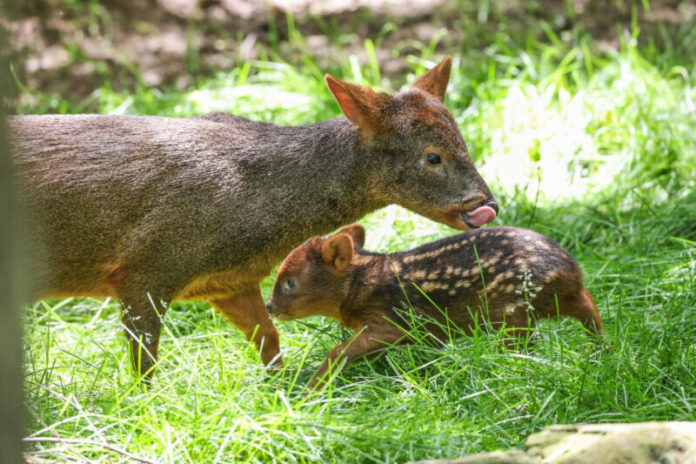As we celebrate Mother’s Day this weekend, Nashville Zoo is proud to announce the birth of a male southern pudu. The fawn was born on Monday, April 28 to first-time parents, Bosa(mother) and Pacu(dad), and is the first southern pudu born at Nashville Zoo. The fawn weighs 1.7 pounds, about the size of a small bag of sugar, making it the sweetest gift for Nashville Zoo this Mother’s Day.
Southern pudus are on an Association of Zoos and Aquariums (AZA) provisional Species Survival Plan (SSP), which means every animal is crucial to the North American population. To support the SSP, the couple was introduced in 2024 as a breeding pair to help bolster the population of southern pudus at AZA accredited facilities. Historically, this species has been difficult to breed successfully, making the addition of this fawn a major win for conservation.
“As a first-time mom, Bosa is doing a great job taking care of the fawn,” said Nashville Zoo Veterinarian Dr. Louden Wright. “We see a lot of animals struggle with their first offspring, but Bosa is taking to it naturally. Both her and the fawn are thriving!”
The fawn will stay with its mom for at least the next year. When he starts to near sexual maturity, he will be placed at another AZA facility and paired for breeding to help maintain the North American population. Nashville Zoo visitors can see the new fawn in its habitat daily near the entrance of the Andean bear exhibit.
Southern Pudu (Pudu puda) are the smallest species of deer in the world and are native to southern Chile and southwestern Argentina. The Southern pudu eats a variety of vegetation, including leaves from shrubs and small trees, fruits, vegetables, bark, bamboo, ferns, vines, grass, flowers, nuts, fungi, and succulent sprouts. Vital to their habitat, Southern pudus make up 50% of Chilean pumas’ diets. Additionally, Southern pudus can modify the abundance, composition, and growth of plants in their habitat, and aid in seed dispersal. Protecting this species ensures their natural habitat remains a functional ecosystem.
According to the IUCN Red List, Southern pudus are listed as near threatened with its population decreasing. The main conservation threats to pudus, particularly the southern pudu, are habitat loss due to deforestation and fragmentation, predation by domestic dogs, and poaching. Other threats include competition with introduced species like red deer and wild boar, and potential disease transmission from domestic animals.
For more information on Nashville Zoo’s conservation efforts, visit www.nashvillezoo.org/conservation.
Subscribe to our FREE Newsletter!
























